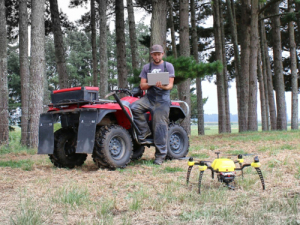Halter goes global, but NZ farmers remain core to innovation
Virtual fencing company Halter is going global but for founder Craig Piggott, New Zealand farmers will always remain their main partners.
 MobileTECH has established itself as one of the leading cross-industry technology events in New Zealand.
MobileTECH has established itself as one of the leading cross-industry technology events in New Zealand.
Five years ago, a small team of tech enthusiasts laid the groundwork for a new primary industry event for Australasia, MobileTECH.
The objective was to bring together and showcase mobile innovations designed to increase productivity within the sector.
In a sector where meetings, conferences, expos or field days run every other week, it was always important that this event had to have a clear purpose. Those involved were excited about the growth in mobile technologies for the rural sector and in the rapid developments in cloud computing, wireless sensors, big data, satellite imagery and others.
In its design, it needed to be an independent programme about the technology and what it can do; not about politics, markets or the business buzzwords of the day.
“We knew the ongoing digital revolution was going to have a dramatic impact on how the primary sector operates,” says programme manager, Ken Wilson. “We wanted MobileTECH to be a place for the rural sector’s brightest minds, technologists, early adopters and innovators to meet and discuss how these new technologies can be best utilised.”
Fast-forward to today, MobileTECH has established itself as one of the leading cross-industry technology events in New Zealand. Over 350 industry representatives attended the previous event back in March 2016. Early interest in the 2017 event in late March has been massive.
The primary sector is still changing. The pace of change is only escalating. Disruptive innovations, especially digital technologies, are driving significant improvements in operational efficiency throughout the sector. To remain internationally competitive, our primary industries must embrace these changes.
In light of this, MobileTECH’s event organiser, CONNEX: Event Innovators, has just announced the programme for 2017.
“We’ve got really inspiring and practical speakers who are delivering real change for the industry,” says Wilson. “This is one of our strongest programmes. The line-up is full of award winning technologies, innovative new platforms and exciting applications.”
The MobileTECH 2017 programme will open with Deloitte’s Andrew Gibbs and Marcel van den Assum from Angel Association NZ, Hannah Fraser from Enterprise Ireland and US-based Zach Gentry from FarmX.
Also, featuring on day one will be innovative farmer’s Tony Walters and Chris Allen, Lachlan Mckay from T&G Pipfruit, Jason Roebuck from StockX Systems, Patrick Verryt from Spark Ventures, Vikram Kumar from KotahiNet, Greg Bodeker from the Centre for Space Science Technology, Jeremy Anderson from Vodafone and Stretchsense’s Sarah Jennings.
The second day’s programme includes Mike Chapman from Horticulture NZ, Alistair Scarfe from Robotics Plus, Andrew Cooke from Rezare Systems, USA-based Sentera Solutions, Fonterra’s Tim Cutfield, Eva Schroer-Merker from Agri One and Australia’s David Edwards from Automed.
Rounding off the list includes famer Nigel Taylor, John Bansfield from DroneMate, Stuart Ralston from Trimble and Bruno Lago from Catalyst IT.
Key topics include how to create and foster an agri tech start-up community in New Zealand, the roll out of the Internet of Things, digitising livestock trading, simplifying real-time business data and disruptive applications.
MobileTECH 2017 will be running on March 22-23, 2017 in Rotorua, New Zealand. The full programme and further details can be found on the event website, www.mobiletech.events
Rangitikei Rivers Catchment Collective (RRCC) chairperson Roger Dalrymple says farmers in his region are taking a national lead in water quality awareness and monitoring.
One young couple is proving farm ownership is still within reach for young Kiwis.
Greenlea Premier Meats managing director Anthony (Tony) Egan says receiving the officer of the New Zealand Order of Merit (ONZM) honour has been humbling.
Waikato dairy farmer Neil Bateup, made a companion of the New Zealand Order of Merit (CNZM) in the New Year 2026 Honours list, says he’s grateful for the award.
Another Australian state has given the green light to virtual fencing, opening another market for Kiwi company Halter.
Farmer interest continues to grow as a Massey University research project to determine the benefits or otherwise of the self-shedding Wiltshire sheep is underway. The project is five years in and has two more years to go. It was done mainly in the light of low wool prices and the cost of shearing. Peter Burke recently went along to the annual field day held Massey's Riverside farm in the Wairarapa.